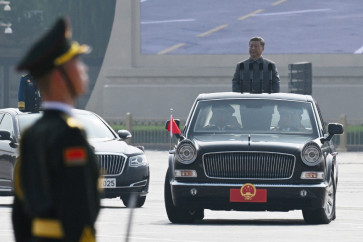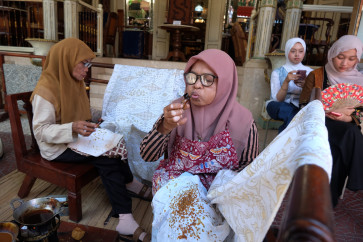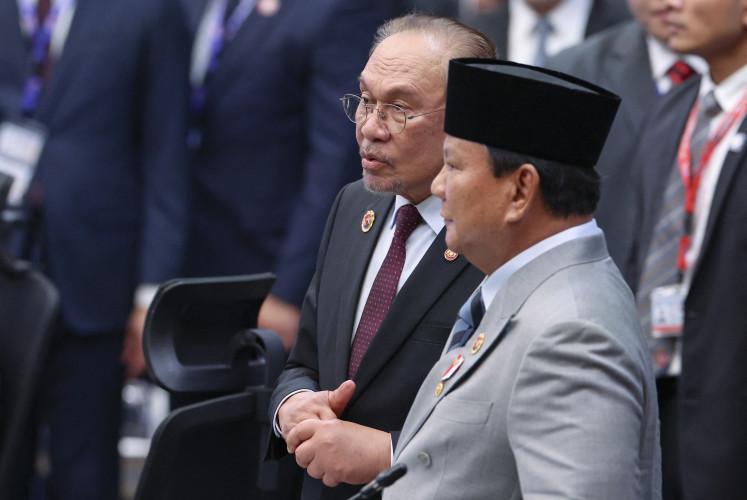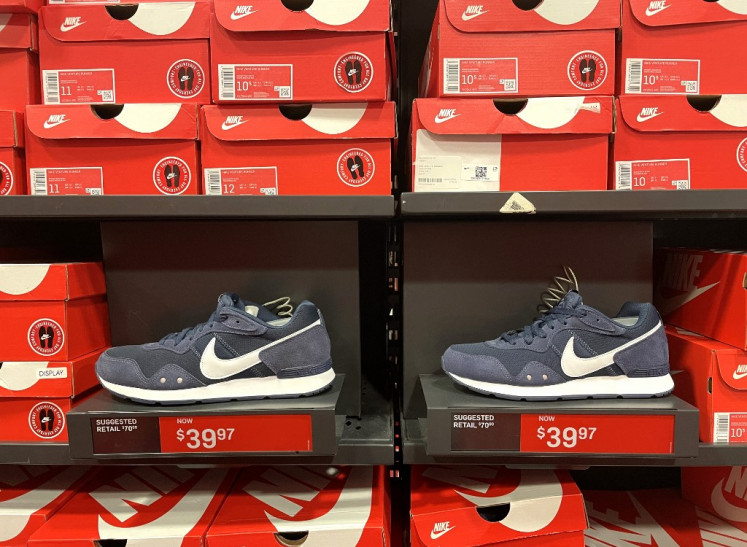Popular Reads
Top Results
Can't find what you're looking for?
View all search resultsPopular Reads
Top Results
Can't find what you're looking for?
View all search resultsMother's Day: Collaborative endeavors needed to empower dementia-sufferers
Keeping active: Former health minister Nafsiah Mboi (sixth from left) leads a release of doves along with members of Komunitas Peduli Lansia (Care for the Elderly Community), marking the start of a healthy walking program for the elderly in Jakarta
Change text size
Gift Premium Articles
to Anyone
 Keeping active:: Former health minister Nafsiah Mboi (sixth from left) leads a release of doves along with members of Komunitas Peduli Lansia (Care for the Elderly Community), marking the start of a healthy walking program for the elderly in Jakarta. (ALZI/Dipa Mulya) (sixth from left) leads a release of doves along with members of Komunitas Peduli Lansia (Care for the Elderly Community), marking the start of a healthy walking program for the elderly in Jakarta. (ALZI/Dipa Mulya)
Keeping active:: Former health minister Nafsiah Mboi (sixth from left) leads a release of doves along with members of Komunitas Peduli Lansia (Care for the Elderly Community), marking the start of a healthy walking program for the elderly in Jakarta. (ALZI/Dipa Mulya) (sixth from left) leads a release of doves along with members of Komunitas Peduli Lansia (Care for the Elderly Community), marking the start of a healthy walking program for the elderly in Jakarta. (ALZI/Dipa Mulya)
Keeping active: Former health minister Nafsiah Mboi (sixth from left) leads a release of doves along with members of Komunitas Peduli Lansia (Care for the Elderly Community), marking the start of a healthy walking program for the elderly in Jakarta. (ALZI/Dipa Mulya)
Disorientation and memory loss are among the signs that a person has dementia or Alzheimer's. Irritation and forgetfulness are common reactions to people with Alzheimer's. DY Suharya, whose mother was diagnosed with Alzheimer's, initially reacted in that way, but after learning more about the condition, regretted her attitude. The founder of Alzheimer's Indonesia tells of her family's experience with the disease.
It all started with a phone call on a Friday afternoon from Dad letting me know that Mom had been diagnosed with malnutrition both by her geriatrician and her dentist. It was 2008 and I had just started working on my PhD in Public Health at Curtin University in Perth, Western Australia.
A year later, the situation worsened ' my Mom was not only malnourished, but the doctor's MRI test and assessment had diagnosed her with vascular dementia, the second most common cause of dementia ' accounting for between 20 and 30 percent of all dementia cases ' and results from decreased blood flow to the brain, which deprives brain cells of essentials nutrients and oxygen.
The official diagnosis from the doctors, received in 2009, affected me deeply and eventually motivated me to leave Australia and come back to be near my Mom in early 2012. It also inspired me to establish Alzheimer's Indonesia (ALZI) in August 2013, a not-for-profit organization that aims to improve the quality of life of people with dementia and their caregivers in Indonesia.
According to the WHO, dementia is a syndrome that results in the progressive deterioration of cortical functioning including language, judgment, comprehension, memory, thinking and learning.
As dementia advances, the person's ability to carry out day-to-day activities such as shopping or managing finances declines, eventually resulting in the person needing assistance to undertake even the simplest activities.
According to fightdementia.org.au, Alzheimer's disease, first identified by Alois Alzheimer in 1906, is the most common cause of dementia, accounting for 50 - 75 percent of dementia cases. The disease affects adults of any age, but usually occurs after age 65 and is characterized by changes in the brain resulting from a build-up of abnormal plaques and tangles.
In 2013, there were 44 million people worldwide diagnosed with dementia. It is estimated that by 2030, there will be 76 million people with dementia and 135 million by 2050.
There are 7.7 million new cases of dementia every year worldwide and one new case every four seconds. Global economic losses from dementia are estimated at US$604 billion. In Indonesia, the estimated number of people with dementia was one million in 2013, and will double to two million in 2030 and again to four million in 2050.
The economic cost for Indonesia is estimated to reach US$ 1.7 billion per year, according to WHO publication Alzheimer's Disease International 2012.
At a workshop at Erasmus Huis Jakarta during World Alzheimer's Month in September 2014, RSCM director Dr. dr. Heriawan Soejono SpPD, KGer revealed that four times as many women as men get Alzheimer's disease, in part because women tend to live longer than men and the chance of developing Alzheimer's increases with age.
In her teens, my mom was the director of a cinema owned by her brother in Subang, West Java, but when she married my dad in 1958, she seemed to lose interest in life. She gradually became antisocial and did not engage in any physical activity or community projects in her neighborhood.
My mom was 75 when she received the diagnosis from the doctors, but from what I can recall she had been gradually demonstrating each of the 10 warning signs of Alzheimer (See box below) for 20 years. Her behavior was one of the reasons I avoided her and settled overseas.
I finally understood that the arguments and generally dysfunctional relationship that I had with my mom, my irritation at her forgetfulness and tendency to repeat questions over and over again, her arguments with all of the members of our family, were because of this disease that had been creeping within her for so many years without anyone in the family realizing. If I knew back then that my mom was actually struggling with dementia, I wouldn't have made fun of her repetitive questions. I would have dragged her to the nearest place she could engage in physical activity or community work, which would have stimulated her brain and made her feel empowered and valued.
Increased life expectancy
Over the past 10 years, there has been an increase in life expectancy in Indonesia from 68.6 years to 72.7 years, according to Renstra, Ministry of Health, 2012. With the increase in life expectancy and disability, dementia -related quality of life of the elderly will increasingly weigh on families, communities and governments in the economic, psycho-social, political and legal fields.
In my years as a student living in Australia, I got a job working part time as a bus driver. My job was to pick up and drive elderly and special needs people from their homes to workshops and offices, where they would produce headsets for Qantas Airways or Christmas cards for Hallmark. They were paid A$2000 per month by the government and private sector as part of corporate social responsibility (CSR). I believe we could make a similar scheme happen here. What is the key word? Collaboration!
A national collective action in the public and private sectors and among policymakers to address dementia has just been launched, involving an awareness campaign to reduce the risk of Alzheimer's with the tagline 'Jangan Maklum Dengan Pikun' (Don't underestimate memory loss). It is a public-private partnership collaboration including the Health Ministry, the Social Affairs Ministry and the DKI Jakarta administration and supported by private-sector industries such as pharmaceuticals, banks, fast-moving consumer goods and the media, as well as NGOs and research institutions.
What lessons have I learned? That activating your highest potential remains important for all age groups. Awareness and knowledge of the issues involved are critical and will eventually lead to the empowerment of elderly people who are still productive and can still contribute to the community in a meaningful way.
I also learned that what is good for your heart is good for your brain and that nutrition is undoubtedly important in minimizing the risk of dementia. Risk factors include age, family history, strokes, diabetes, obesity, high cholesterol, hypertension, depression and physical inactivity.
My dream is to institute a collaborative partnership of work and commitment between the government, the private sector and NGOs, as well as communities, to empower the elderly to continue being active both physically and mentally. Eventually, I would like to see a dementia-friendly city established with all support systems in place in this country.
My mom is now in the last stage of Alzheimer's, and I know there's nothing I can do to make the disease go away. There is no cure. However, she has empowered me to initiate further collaboration, as mentioned above, with the government, private sector, institutions, support groups, communities and many more, to reduce people's risk of contracting dementia or any other non-cardiovascular disease. Take my advice: be physically active, look after your heart, follow a healthy diet, challenge your brain and enjoy social activity.
The vision is to have a city in which people with dementia and the elderly can walk around, gather together and enjoy places that provide stimulating fun, productive and empowering activities ' singing, dancing, angklung (bamboo musical instruments), congklak games ' all in the framework of a public-private partnership approach.
Thank you Mom, for being such an inspiration, Happy Mother's Day, with love.
________________
The writer is partners relations specialist ' CCPHI
Executive director of Alzheimer Indonesia alzheimerindonesia@gmail.com









